[ad_1]
Their weekly staff meeting had become a crisis debriefing, and Axios employees were wondering where things had gone wrong. “This is small,” one staffer said, according to audio obtained by HuffPost, “but I have a question along the business-editorial line.”
His question was for Axios editor-in-chief Nicholas Johnston, who was meeting on Nov. 1 with a few dozen editorial staffers. The subject was a clip released by Axios two days earlier. More precisely it was the outrage over the video, from the first episode of “Axios on HBO,” a show that pairs two brands aimed at the tastemaking elite: One is known for high-production-value fluff and lots of gratuitous boobs. The other is HBO.
In the clip, reporter Jonathan Swan coaxes President Donald Trump toward a lunatic vow to eliminate birthright citizenship, which is guaranteed in the 14th Amendment and cannot be dumped by executive order. Swan, Axios’ golden child, seems almost gleeful as the president muses about a little light ethnic cleansing by decree. Swan offers only the softest of pushbacks. (“I mean, that’s in dispute,” he says). Linking to the story on Twitter, he said he was “excited to share” the clip and accompanying story, written by him with Stef W. Kight and originally headlined “Exclusive: Trump to terminate birthright citizenship.” The response to the video and the story was near–universal disgust.
In the staff meeting and in conversations over Slack last week, Axios employees reckoned with that disgust. The audio and the Slack screenshots were given to HuffPost by an Axios source, who requested anonymity for fear of retribution. Missteps were acknowledged in these exchanges. Some of the criticism was fair, a few employees allowed.
But by and large, staffers made clear that they put little stock in their critics. The issues were all external — the HBO show (“a shitshow,” as Johnston put it), jealous competitors who “hate us ’cause they ain’t us,” the remorseless passage of time. The problem was everything but Axios itself. No one seemed willing to acknowledge the obvious lesson: The crisis was the well-earned result of the site’s own brand of journalism.
It was Swan and Kight’s story that worried the employee with the editorial question at the staff meeting. For starters, there was the first paragraph, which read:
President Trump plans to sign an executive order that would remove the right to citizenship for babies of non-citizens and unauthorized immigrants born on U.S. soil, he said yesterday in an exclusive interview for “Axios on HBO,” a new four-part documentary news series debuting on HBO this Sunday at 6:30 p.m. ET/PT.
Wasn’t this too naked a publicity grab for the show? “Something about putting the airtime of the show in the lead of that story did not read right to me,” the employee said. “I think, ‘It airs this Sunday is one thing.’ But the ‘6:30 Eastern, 5:30,’ it looked —”
“A little thirsty?” Johnston offered.
Another employee agreed “that it didn’t look right.” The staffer elaborated, “How it happened was that HBO was like, ‘Please put this exact wording in the lede, and then let this go out before 7.’”
(Asked whether HBO had any say over the site’s news posts, Axios spokeswoman Megan Swiatkowski replied, “What I can say, broadly speaking, is Axios alone has editorial control on all things Axios, now and forever.” Her full statement is at the bottom of this post.)
Some staffers evidently weren’t comfortable with a news story being shaped into a promotional vehicle for a television series. This was about more than just the first paragraph. A quote in the story left unchallenged Trump’s false claim that the United States is the only country to offer birthright citizenship. (A parenthetical was subsequently added.) And the original headline — later changed to “Exclusive: Trump targeting birthright citizenship with executive order” — ascribed powers to the president that he does not possess. “In the trust ring here, I will say we have a CEO with a gift for headlines,” Johnston said earlier in the meeting, referring to Jim VandeHei. “And in the past, for some of us in editorial leadership, have had to rein them in. I was on the West Coast, and I didn’t see it. Thank God it didn’t say, ‘Shock: [inaudible].’”
Several things conspired to make the story seem “inflammatory in service of promoting our HBO show,” as one employee put it. “The combination of the headline, the very obvious and unchecked fallacy just block-quoted in the middle of the post, and the date and time of the show at the top of the post. Like, all three of those things together — four if you count the optics of, I don’t know, however you want to read [inaudible] Swan in the middle of the interview — it just, it looked bad. It looked bad in a lot of different ways, and it all added up.”
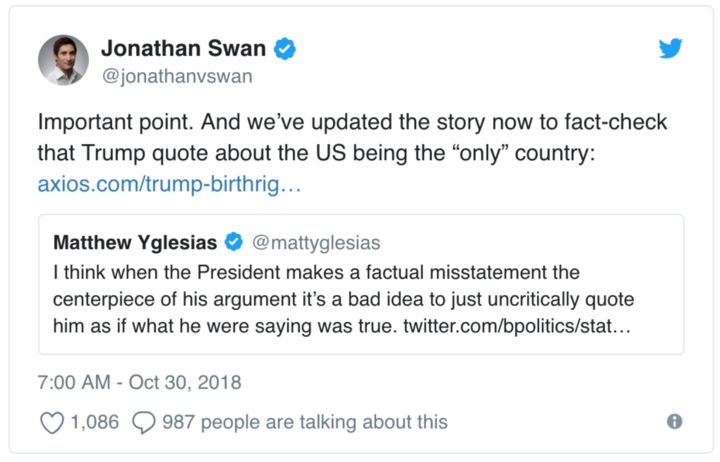
The horserace sensibility, the chumminess with power, the aggressive sell job bleeding into the journalism, the fetish for information for its own sake, denuded of context — the things alluded to by the staffer as contributing to the article’s unseemliness happen to be the very things that define Axios.
Politico alums Mike Allen and Jim VandeHei founded the site in 2016 because, as its manifesto tells us, news stories are just “too long” or “too boring.” Their solution was to offer up stories consisting mainly of brief bullet-pointed items, often concluding with a “Be smart” — the story reduced to its most basic moral, the one line you need to do your best cable pundit impression. Axios, likewise, is journalism reduced to the transaction at its heart, untroubled by critical thought or morality. In exchange for access, the reporter effectively self-lobotomizes, suspending editorial judgment and becoming a messenger for someone else’s message. Swan’s exchange with Trump and the story that resulted made for a quintessential Axios moment.
In the meeting, however, the story’s mistakes were attributed to haste. “Nobody bats a thousand,” Johnston pointed out. As for the headline, “we get, like, 95 percent of them right. That one we leaned in too far. I had not thought about the 9:30 time airing. I don’t hate it — I don’t love it. I kind of hate it a little more now, hearing this feedback.”
He said a little later, “A lot of this is learning how to do this, right? This HBO show is a shitshow because we’re just sort of doing it by the seat of our pants. And if our worst nightmares come true and it gets picked up and we do it again next year, I hope we’ll have learned a lot of lessons on how to build structure for this and how to not be obnoxious about it. Like, remember, the interview taped … this was turned around in 12 hours. Because of all these sort of pieces coming together, it’s tough to do it that quickly, and that’s, I think, where some of these things slipped through.”
An employee chimed in, “We thought that this was a competitive story, that was part of the rush. We were concerned about getting scooped. And so there was … so that turnaround time was bonkers.”
The quick turnaround may have caused some of Axios’ problems, but as Swan repeatedly noted, he had been working on the story for weeks. It’s hard to imagine someone would spend that long chasing down a story without learning about the relevant details.
The day after the story went up, Swan sent an early-morning message of semi-contrition to his colleagues in Slack. (A portion of it was quoted in The New York Times.)
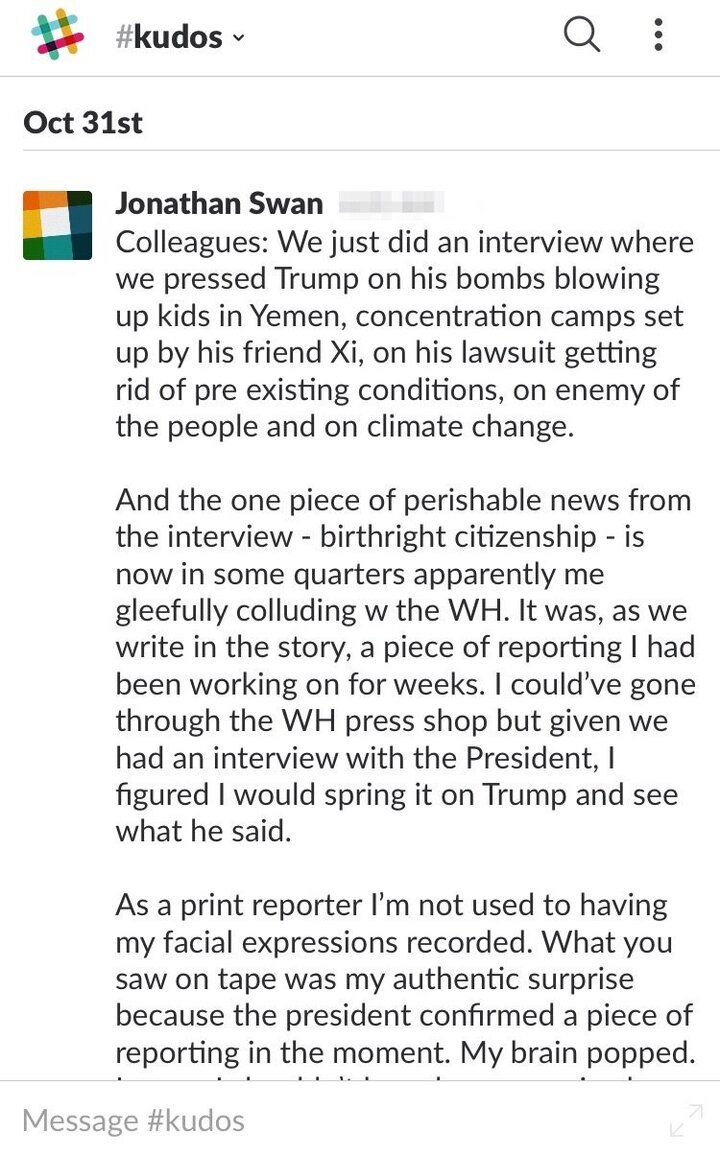
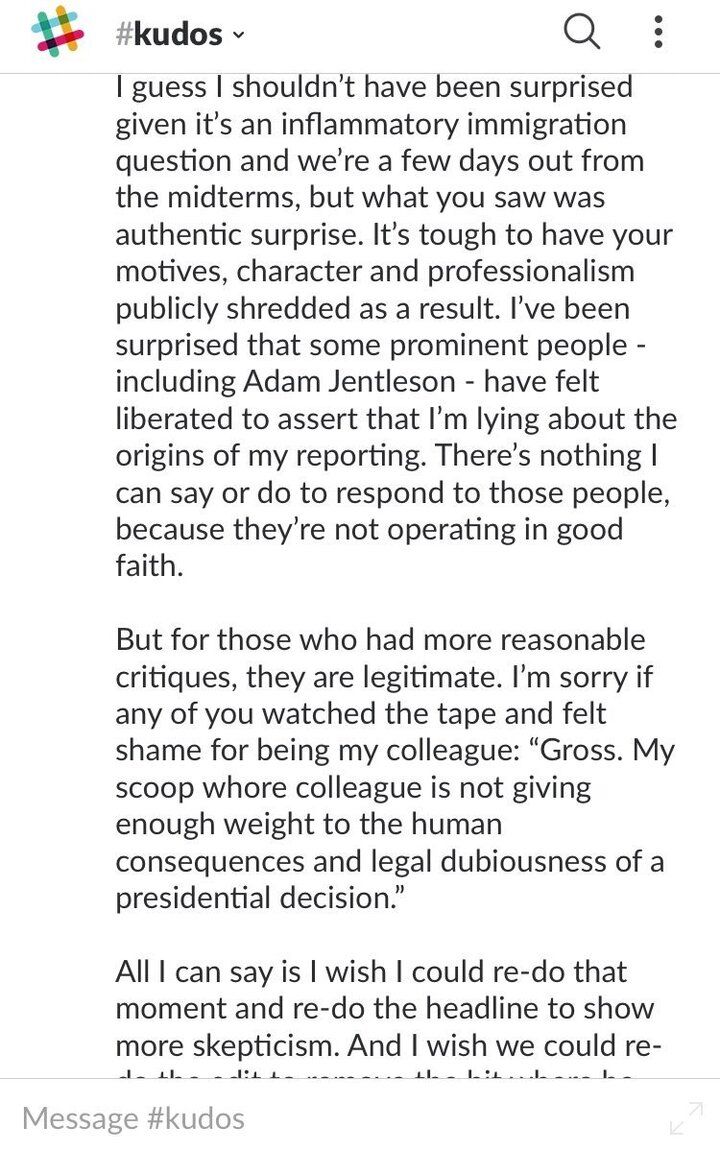


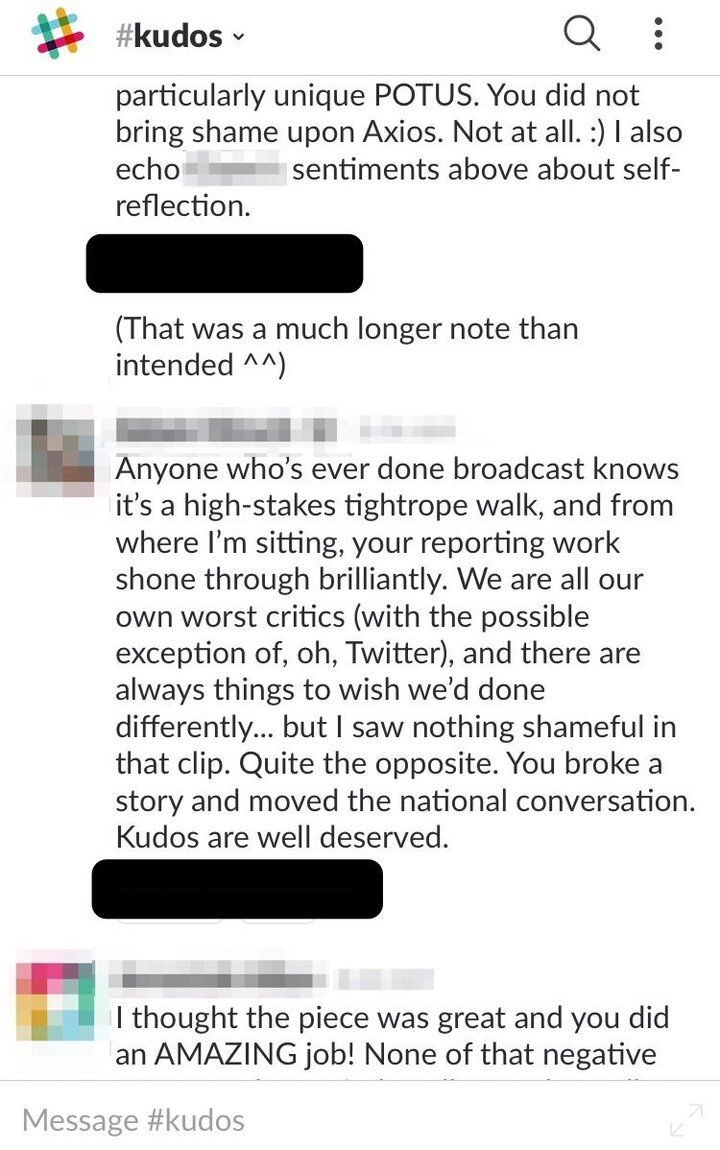
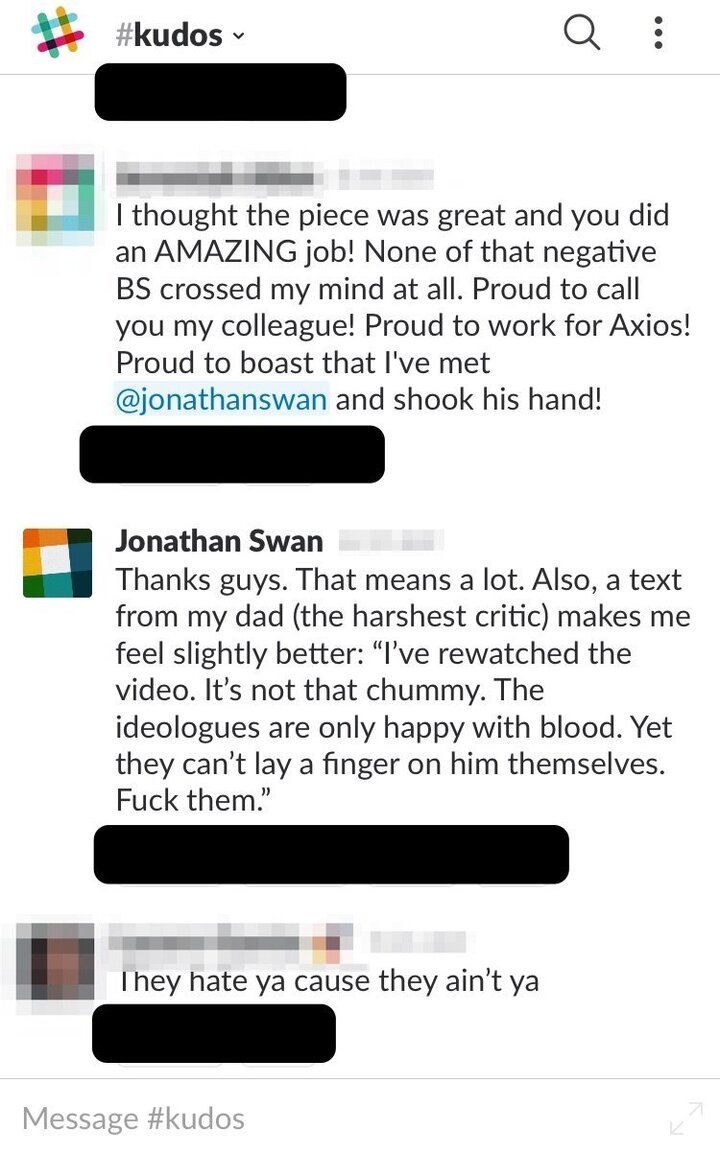
Wagons were being circled around Swan and Axios in general, both in its #kudos Slack channel and on a channel called #kudonts, usually devoted to sharing lighthearted criticism of the site. “I’ve long learned that it’s pointless to respond to someone being snarky on the internet,” one employee wrote. “Their goal isn’t to be accurate — it’s to make themselves look better by bullying someone else and therefore putting themselves in the Cool Kids club.” Wrote another, “That a culture of tearing down journalists exists on twitter AMONG JOURNALISTS is really neat thing about the internet.”
Employees wrestled with how to best handle the online criticism from media colleagues. During the meeting, one employee brought up the fact that several Axios employees had retweeted “someone who’s shitting on Axios,” referring to the Sam Sanders tweet above. Might such a retweet be interpreted as approval rather than condemnation? Johnston joked that perhaps staffers should just delete their accounts before offering a message that amounted to “fuck the haters.”
“No, we don’t need to delete our accounts,” Johnston said. “We’ll keep our accounts, but I think we can be more circumspect about — and we’re mostly good about this — not engaging with the trolls. … Our profile is going to get bigger and bigger and bigger, and we’re going to have more cool successes. And you know what? We’re on HBO, Splinter.com, and you’re not. You’re fucking laid off by Gizmodo. I’m sorry. So they’re going to come after us on this kind of stuff.”
Splinter, which is owned by Gizmodo Media Group (my former employer), has been particularly critical of Axios, and it apparently struck a nerve.
At least one employee was willing to point out that perhaps not all of Axios’ critics were operating out of jealousy.
“Nick, are you worried about sort of the overall …” the employee said, trailing off. “Because on the one hand, something like that tweet, like, oh, they’re just jealous of our success. But on the other hand, there is real criticism out there, whether or not it’s valid. I mean, are you worried about the perception of us?”
“Am I worried about the brand?” Johnston said. “Not really. I mean, we’ve gone through [inaudible] in two years. I think everybody here works really hard. I think everybody here tries to do their best. I think we do good journalism. I think people hate us ’cause they ain’t us, and we can always do better. So I look at all these criticisms, and I take them very personally. And I think very hard about, how am I going to hire better — better diversity and [inaudible], make Axios better in the future? Are we not writing our best headlines? Are we not being the best presence on social media? Like, I think about all these criticisms a lot. But I also realize that we’re a giant target. We have a little bit of swagger, which I like. Like, we go on television. Mike and Jim are sort of preeny people. So, yeah, we’re sort of proud and braggy about ourselves, and I don’t feel bad about that at all.”
This was a convenient recasting of the criticism directed at Axios. The problem with the site is not that it’s braggy or that its social media presence is lacking in some way. The problem with Axios is that it has confused objectivity with operating from a place free of moral values, that it has become a vessel for those in power to get out whatever message is convenient at the time and that it presents these messages without giving readers any of the tools they need to understand it.
On Sunday evening, Allen sent out an internal newsletter that addressed the situation.
You have heard me say since launch that I was shocked coverage of us — and even the social media response to us — was so positive. You also heard me say it won’t last forever.
Why it matters: I was right. While we got an insane amount of positive or neutral coverage this past week, we also got dinged in some stories and on the satanic cesspool of media-hate also known as Twitter. Here is how we view it:
Some of the criticism was valid. In our birthright citizenship piece, I should have been smarter and forced a bullet-proof headline that said, “Trump to try to terminate birthright citizenship.” We failed to include “try to,” which left the inaccurate perception he could do this without a massive, immediate legal challenge. I also should have fact-checked Trump in initial story when he claimed America alone has this right, which is wrong. I was too focused on the scoop, so lesson learned. We did quickly add but sooner would have been better.
Some of the criticism was offensive BS. The notion Trump wanted this story out was wildly wrong. In fact, it caused tremendous internal issues at the White House because people were trying to disabuse Trump of his belief that this can be done by executive fiat. Swan should have been praised for a great public service.
An NYT piece today raised questions about whether brevity sacrifices depth. I always anticipated this would be the line of attack our critics would roll out when we launched. My feelings on the topic are well-known. I will gladly stage a cage match w/ our reporters versus the NYT any day on who has more depth, experience and scoops on our shared beats.
Be smart: We always need to be humble enough to take valid criticism but also self-confident enough to defend our core beliefs. You can’t buy the amount of public exposure we got this past week for our journalism — and I am proud of all of you.
Everyone is basically wrong, in other words. Axios is right. And look at all this free publicity.
Here’s the full statement from Axios spokeswoman Megan Swiatkowski:
Hi Ashley –
We don’t comment on internal meetings and are not creepy enough to tape them, so I have no idea if this is accurate.
What I can say, broadly speaking, is Axios alone has editorial control on all things Axios, now and forever. The birthright citizenship was pushed out because it was big, consequential, time-sensitive news. This big, consequential news was broken on “Axios on HBO” so we made sure it was clear to readers that this news was broken during an interview for the show – “Axios on HBO,” airing Sunday 6:30 p.m. ET/PT. Episode 2 of a 4-part documentary news series will air this Sunday, also available on demand at HBO.
Remember, the interview had not yet aired so we needed to avoid confusion. Strikes us as pretty straightforward. Thank you for watching and please tune in Sunday. Love, Meg
REAL LIFE. REAL NEWS. REAL VOICES.
Help us tell more of the stories that matter from voices that too often remain unheard.
[ad_2]
Source link

